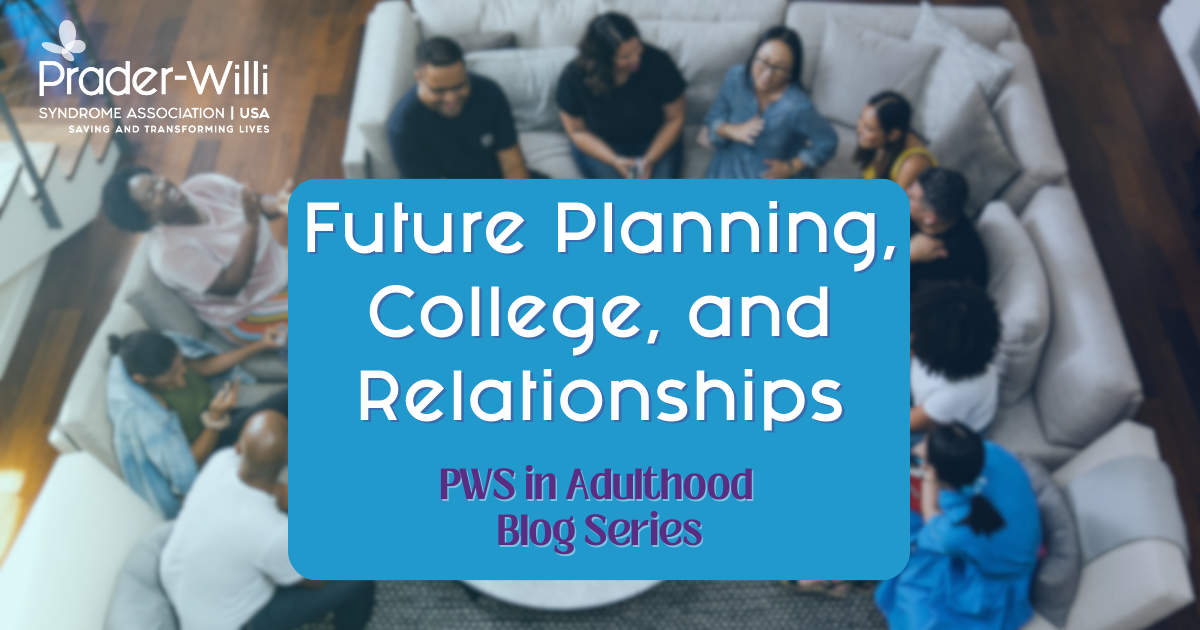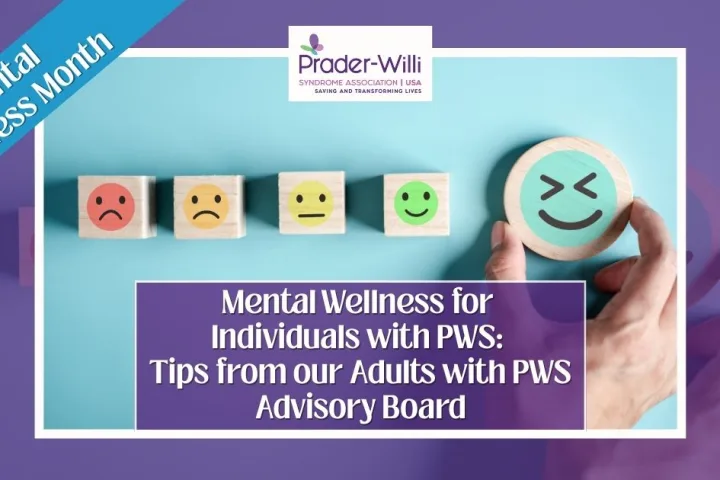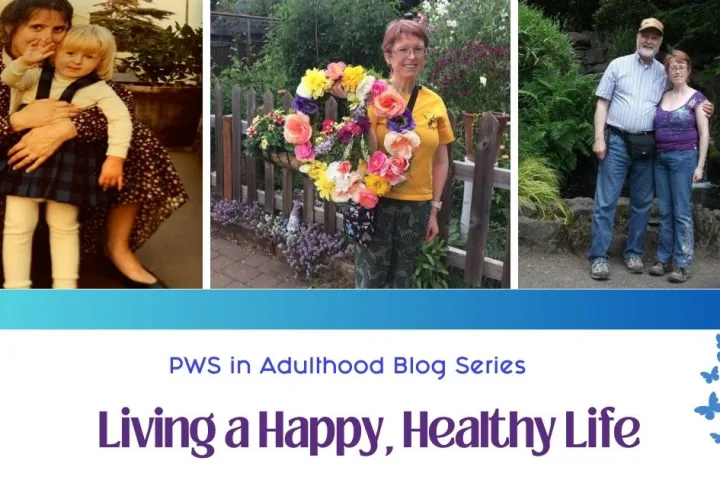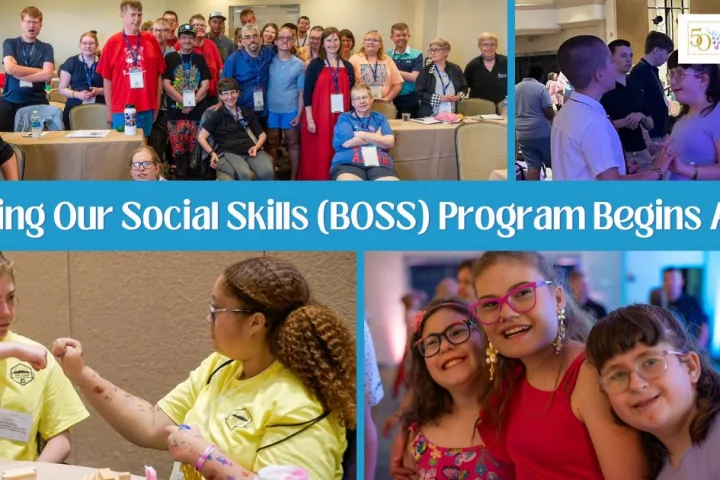Contributed by anonymous
As our loved ones with PWS become adults, they want the same things as anyone else. They want to feel listened to, valued, have friendships/romantic relationships, have a sense of purpose, and live independently. We need to consider how we can accomplish this while considering our loved ones’ individual abilities and needs.
Transitioning Into Adulthood
Planning for adulthood should take place early, ideally as our loved ones enter their teens. High school special education teachers will be able to provide assistance with transitioning to post-secondary life, such as vocational training, day programs, and applying for benefits such as SSDI, Medicaid, and Medicare. State representatives representing these services should be included in high school IEP meetings to help parents navigate identifying and applying for available services.
Some parents choose to become their loved one’s legal guardian based on their family situation. We decided to take this step when we realized that legally when our loved one turned 18 years old, they could make choices and decisions without our knowledge or input because they were considered adults. Our ability to intervene on their behalf was limited without legal guardianship.
Planning for Long-Term
Even though it may be difficult, we also need to think about what will happen to our loved ones after we pass away. Where will they live? How will they be cared for? A plan must be created before we pass. Sometimes family members or friends will volunteer to help with this. If that’s the case we need to make sure these folks have a complete understanding of what they are agreeing to beforehand. They need to have substantial knowledge regarding their loved ones and how PWS impacts them so that they can best care for them. Sometimes families choose to move their loved ones to a residential program as they become older. We chose this route to avoid putting additional responsibilities on their siblings and to ensure that our loved one was settled before we pass.
Residential Settings
Our loved one has lived in both a residential setting that did not specialize in caring for folks with PWS, and a residential program that did. Our experience was that while well-intentioned, unless staff is specifically trained and their policies/procedures account for the unique needs of folks with PWS, that the non-PWS specific residential programs could not keep our loved one safe, healthy, and happy. Our state required that we try an instate non-PWS residential program before agreeing to fund a PWS-specific residential program that was out of state.
College and Work Experiences
Many of our loved ones want to attend college and/or have jobs. Most colleges have specialized programs for differently abled folks that our loved ones can attend and enjoy. Others can successfully take regular college classes, with the support of a 504 plan. These plans provide our loved ones with individualized supports, similar to what an IEP does in elementary and secondary schools. Some of our loved ones want to get jobs. Vocational training is typically offered starting in high school, where our loved ones can get job training and assistance in gaining employment. Special education teachers/case managers will be able to assist with this. Our loved one has had jobs and taken college classes. We found maintaining employment was challenging. Food is available even where it’s least expected, and this proved very stressful for our loved ones. They also became anxious when tasks or schedules changed, which often happens in most jobs. They were more successful in college classes, taking just one class at a time.
Relationship Advice
As my kids were growing up, our family thought it was important to have ongoing discussions about friendships, romantic and sexual relationships with them in age-appropriate terms. Our loved one has had a few romantic relationships since becoming an adult. Before this happened, they participated in a series of classes provided by their residential program regarding respect, boundaries, consent, and safety. I think it’s important that families support our loved ones in relationships in ways that they are comfortable with while keeping their loved ones safe. I would strongly recommend that young women have some sort of birth control. While it’s generally thought that folks with PWS are not able to have children, our family is not willing to risk an unintended pregnancy.
If you would like to share your advice and the experiences you’ve learned from with an adult with PWS, please email africke@pwsausa.org.
Share this!





 Perry A. Zirkel has written more than 1,500 publications on various aspects of school law, with an emphasis on legal issues in special education. He writes a regular column for NAESP’s Principal magazine and NASP’s Communiqué newsletter, and he did so previously for Phi Delta Kappan and Teaching Exceptional Children.
Perry A. Zirkel has written more than 1,500 publications on various aspects of school law, with an emphasis on legal issues in special education. He writes a regular column for NAESP’s Principal magazine and NASP’s Communiqué newsletter, and he did so previously for Phi Delta Kappan and Teaching Exceptional Children. Jennifer Bolander has been serving as a Special Education Specialist for PWSA (USA) since October of 2015. She is a graduate of John Carroll University and lives in Ohio with her husband Brad and daughters Kate (17), and Sophia (13) who was born with PWS.
Jennifer Bolander has been serving as a Special Education Specialist for PWSA (USA) since October of 2015. She is a graduate of John Carroll University and lives in Ohio with her husband Brad and daughters Kate (17), and Sophia (13) who was born with PWS. Dr. Amy McTighe is the PWS Program Manager and Inpatient Teacher at the Center for Prader-Willi Syndrome at the Children’s Institute of Pittsburgh. She graduated from Duquesne University receiving her Bachelor’s and Master’s degree in Education with a focus on elementary education, special education, and language arts.
Dr. Amy McTighe is the PWS Program Manager and Inpatient Teacher at the Center for Prader-Willi Syndrome at the Children’s Institute of Pittsburgh. She graduated from Duquesne University receiving her Bachelor’s and Master’s degree in Education with a focus on elementary education, special education, and language arts. Evan has worked with the Prader-Willi Syndrome Association (USA) since 2007 primarily as a Crisis Intervention and Family Support Counselor. Evans works with parents and schools to foster strong collaborative relationships and appropriate educational environments for students with PWS.
Evan has worked with the Prader-Willi Syndrome Association (USA) since 2007 primarily as a Crisis Intervention and Family Support Counselor. Evans works with parents and schools to foster strong collaborative relationships and appropriate educational environments for students with PWS. Staci Zimmerman works for Prader-Willi Syndrome Association of Colorado as an Individualized Education Program (IEP) consultant. Staci collaborates with the PWS multi-disciplinary clinic at the Children’s Hospital in Denver supporting families and school districts around the United States with their child’s Individual Educational Plan.
Staci Zimmerman works for Prader-Willi Syndrome Association of Colorado as an Individualized Education Program (IEP) consultant. Staci collaborates with the PWS multi-disciplinary clinic at the Children’s Hospital in Denver supporting families and school districts around the United States with their child’s Individual Educational Plan. Founded in 2001, SDLC is a non-profit legal services organization dedicated to protecting and advancing the legal rights of people with disabilities throughout the South. It partners with the Southern Poverty Law Center, Protection and Advocacy (P&A) programs, Legal Services Corporations (LSC) and disability organizations on major, systemic disability rights issues involving the Individuals with Disabilities Education Act (IDEA), Americans with Disabilities Act (ADA), and the federal Medicaid Act. Recently in November 2014, Jim retired.
Founded in 2001, SDLC is a non-profit legal services organization dedicated to protecting and advancing the legal rights of people with disabilities throughout the South. It partners with the Southern Poverty Law Center, Protection and Advocacy (P&A) programs, Legal Services Corporations (LSC) and disability organizations on major, systemic disability rights issues involving the Individuals with Disabilities Education Act (IDEA), Americans with Disabilities Act (ADA), and the federal Medicaid Act. Recently in November 2014, Jim retired.